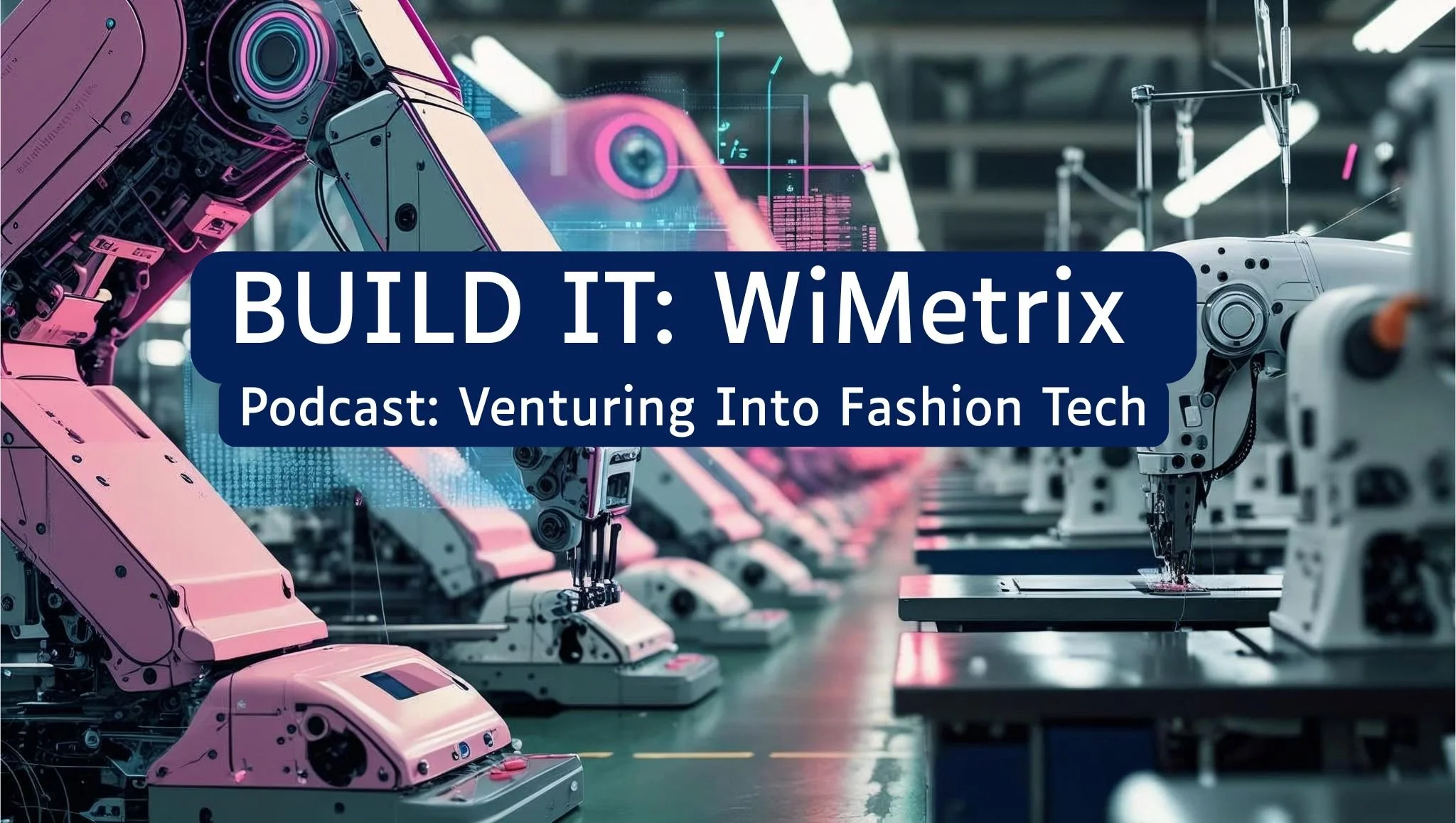Build It: Rethinking Fashion’s Supply Chain using AI with WiMetrix’s Abdul Moiz Sajjad
Welcome back, fashion tech enthusiasts!
This article accompanies the debut episode of our podcast series Build It, where we ask: can technology transform Pakistan’s fashion industry from the inside out? Host Peter Jeun Ho Tsang sits down with Abdul Moiz Sajjad, CEO of WiMetrix, to explore how AI, automation, and data are reshaping the sector by tackling inefficiencies, advancing sustainability, and reimagining its future. Their conversation sets the stage for a broader discussion on innovation, impact, and what's next for one of the world’s most critical garment manufacturing hubs.
Listen to the full conversation:
Revolutionising Pakistan’s Fashion Industry Through Technology
Abdul Moiz Sajjad has made it his personal mission to solve fashion supply chain problems, starting in Pakistan but aiming to scale globally. He explores the potential transformative impact of technology, particularly AI and automation, on one of Pakistan's most vital economic sectors, the textile and garment industry. According to a 2021 Pakistan Country Study, an estimated 2.2 million people are employed in Pakistan’s garment factories, meaning that technological improvements in the industry could affect a significant number of Pakistani people.
Abdul shares his path from electrical engineering to leading a company at the forefront of data-driven solutions, offering invaluable insights into how digitization has the potential to reshape the textile and garment industry.
His journey begins in Lahore, a hub of small-scale manufacturing. He began his career in electrical engineering and later transitioned into the tobacco industry. In these roles, he saw efficiency increase from 40% to 70% through the implementation of data-driven decisions. After these pivotal experiences, Abdul saw just how transformative technology could be if applied to the fashion industry, especially given its immense scale and influence in his home country.
As he puts it, “If you really want to do something for your country, then this is the industry in which you want to contribute.”
A Sector at a Crossroads: Challenges and Opportunities
Pakistan's textile and garment sector is crucial, accounting for 55% of the nation’s exports according to Fibre2Fashion. However, the industry faces significant challenges, including climate change and sustainability concerns, as well as ethical issues across the supply chain. Abdul explains how these pressing issues can be addressed through the use of advanced technologies to have real-time factory analytics. He underscores the need to move beyond small changes and radically reimagine existing processes, referencing innovations like Japan Railways’ high-speed trains as examples of bold technological progress. In the case of revamping the trains, engineers had to look at the issue from a completely new perspective in order to maximize advancements. Given the fashion industry’s vast impact, innovative solutions and improvements should be just as bold. Following this mindset, Abdul set his mind to how AI could be leveraged to fix inefficiencies within the fashion supply chain.
Abdul explains how AI is transforming the textile industry, using real-time data and big data analytics to drive the shift. AI doesn’t just boost efficiency and agility, it empowers brands to educate consumers about the true environmental cost of their clothing, a crucial step toward meaningful climate accountability. He brings attention to the challenges manufacturers face, particularly in heat-stricken regions like Pakistan, where outdated infrastructure struggles to keep up. To address this, Abdul urges the industry to adopt innovative technologies and embrace transparency. Supporting these factories, he argues, isn’t just the right thing to do, it’s a smart economic decision for the future of global fashion.
Many consumers are putting their money where their values are, showing a growing willingness to invest more in what matters to them. According to IBM research insights, half of consumers say they’d pay extra for brands committed to sustainability—on average, about 70% more. Following Abdul’s ethos and goals, these consumers would respond positively to a transparent supply chain as he imagines it, explaining, “As a customer you don’t understand that two of the same garments, probably of the same materials but of different washes have different carbon footprints.” If given all the details of the supply chain, they would likely opt for a greener approach.
Abdul urges consumers to ask better questions, to push for greater transparency in the fashion industry, saying, “A data platform must exist in this entire supply chain that eventually tells the end customer that if you buy a certain garment, it will have this much carbon footprint… so that they can make an informed decision.” Imagine being able to see the carbon footprint of your clothing—from the very first thread to the final stitch. That kind of insight, he believes, would empower you to make choices that truly matter and nudge the industry toward meaningful, lasting change.
Something meaningful is unfolding in Pakistan’s garment industry—one of the world’s key hubs for fashion production. Because of its global reach, the changes happening there have the power to influence supply chains far beyond its borders.
As Peter puts it, “Until you’ve really been to a garment factory in some rural countryside, you don’t really see or realize the conditions people are putting themselves in just to survive.” His words highlight just how transformative greater transparency could be—not only for the industry, but for the people whose lives depend on it.
Want to Learn More and Connect?
If you believe in smarter supply chains and sustainable fashion, support Abdul’s mission and explore the work WiMetrix is doing to reshape the industry from the inside out. Visit wimetrix.com to learn more.
This episode offers a powerful look at how technology is reshaping fashion in Pakistan—and why that shift matters on a global scale. If you're a founder or brand leader looking to build smarter, more sustainable supply chains, Wimetrix can help. Book a demo at Beyond Form to see how our tools bring real-time visibility and data-driven insights to your production process. Let’s shape the future of fashion—together.
Connect with Abdul and Peter on LinkedIn to learn more about what they’re up to and innovating!

